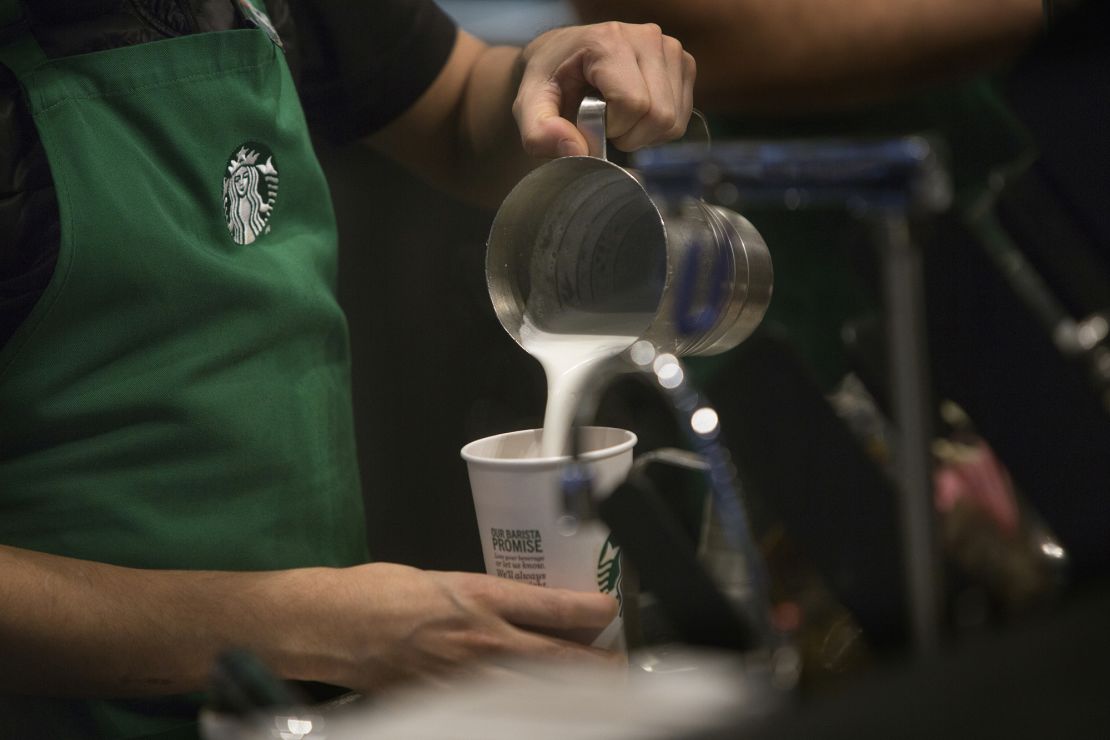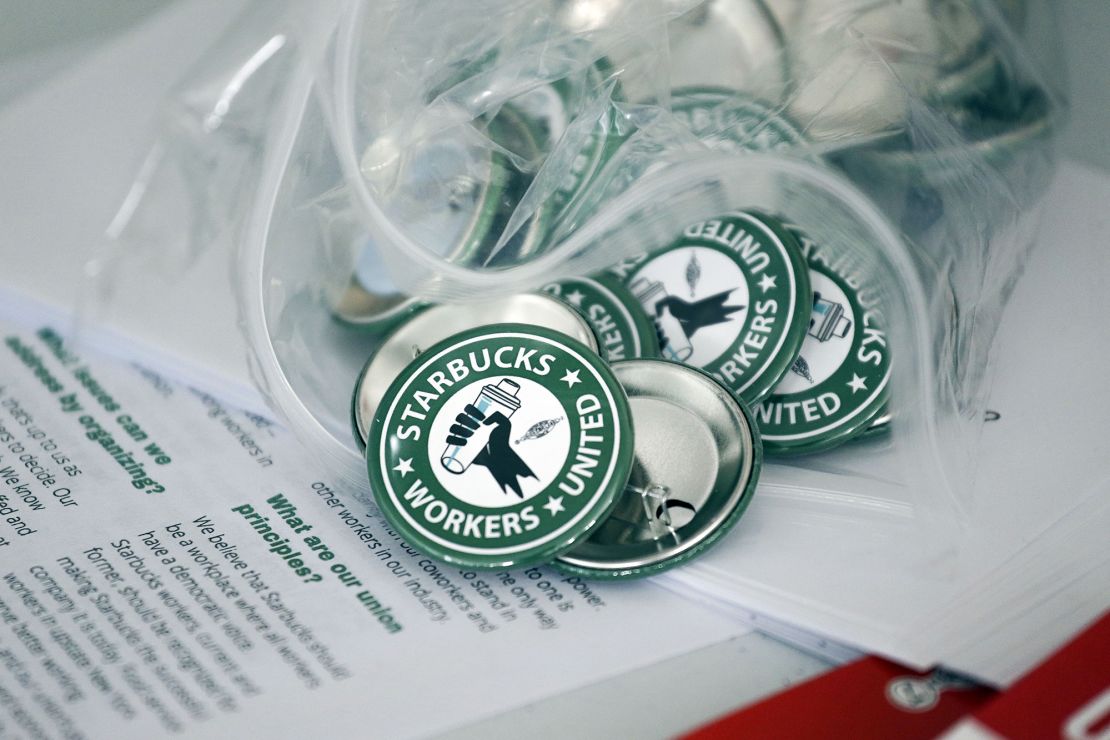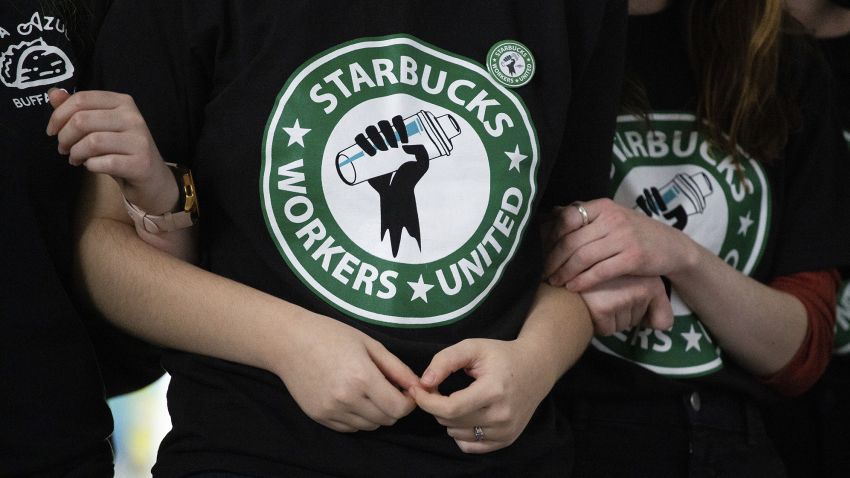Starbucks employees are getting more pay and new benefits, but some are only going to baristas that haven’t unionized. A National Labor Relations Board judge previously found that similar moves by Starbucks violate federal labor law, with the company appealing the decision.
The question of which workers get what perks and benefits has been one part of a bitter fight between Starbucks and union organizers across the country. Since the first location voted to unionize nearly two years ago, Starbucks has fought aggressively against the union drive. The NLRB has said that in some cases, the company engaged in illegal practices, with Starbucks refuting these claims.
As of mid-October, nearly 360 stores had voted in favor of a union, with the results certified by the NLRB. About 70 voted against, with those results certified. There are roughly 9,300 company-operated Starbucks locations in the United States.
The latest round of new benefits, including wage increases, was announced by the company on Monday.
Investments in pay lead to “increased stability and higher retention,” Sara Kelly, Starbucks’ chief partner officer, said during a Thursday investor event, where the announcement was previewed (Starbucks refers to its employees as partners). Plus, she said, the improved benefits will prompt workers to “create an even more uplifting customer experience.”
Who gets what
Non-union employees will be eligible to accrue more vacation time sooner, but when it comes to pay, things are a little trickier. Starbucks said Monday that a 3% annual increase will take into effect on January 1 for all eligible workers at company-operated US stores. Workers who have been at Starbucks for 2-5 years will get a pay bump of at least 4%. And those who have at least five years under their belts will get a lift of at least 5%, Starbucks said.
Union members will get whatever increases were locked in last year, which vary. That means that many workers will get the 3% or 4% hike, and some the 5%, even if they are unionized. But the company will not offer new increases in pay, or vacation accrual benefits, to unionized workers — unless it is forced to concede those based on collective bargaining negotiations.
All employees, regardless of union status, should benefit from better scheduling as part of a company initiative designed to help give workers the hours they want based on their own feedback.

Over the past few years, Starbucks has argued that it can’t legally offer certain new benefits to unionized employees, claiming that it has to bargain with the union before it can offer them wage increases. But a National Labor Relations Board judge ruled against the company, saying that Starbucks violated federal labor law when it increased wages and offered new perks and benefits only to non-union employees.
By offering new wage increases only to non-unionized baristas, the company engaged in a “flagrant, corporate-wide attack on its employees’ right to choose union representation,” the judge said.
Starbucks has appealed the decision and remains firm in its stance.
“Starbucks has adhered to long-standing legal obligations, which required it to differentiate between unionized or organizing partners and partners in all other stores,” Starbucks spokesperson Rachel Wall said in a statement to CNN Monday. “Wherever we can quickly and broadly improve partner benefits and perks we have and always will,” she said, adding “all union represented stores will receive annual wage increases consistent with our practice of providing yearly wage increases.”
Both Starbucks and union organizers have accused the other side of dragging its feet to the bargaining table, while NLRB regional offices have also issued complaints alleging that the company has failed or refused to bargain in many cases. A hearing for a consolidated complaint on the issue remains ongoing.
“Withholding benefits from unionized stores is against the law,” said Starbucks Workers United member Alex Yeager in a statement shared by union representatives Monday. Yeager further argued that the union’s efforts have led to some of these changes. “We’ve been speaking out and going on strike for scheduling changes for more than two years,” Yeager said.
The union has also said that its efforts led Starbucks to add credit-card tipping at non-union locations.

Locations that have successfully voted to unionize have faced strong opposition from the company, which in some cases has been illegal, according to the NLRB.
Earlier this year, an NLRB judge said that Starbucks had displayed “egregious and widespread misconduct” in its dealings with employees involved in efforts to unionize Buffalo, New York, stores. Starbucks said in a statement at the time that it is “considering all options to obtain further legal review,” adding that “we believe the decision and the remedies ordered are inappropriate given the record in this matter.” Starbucks has appealed and the case is still open.
Starbucks’ message to investors
Starbucks teased the new pay and benefits during an investor event on Thursday, where it discussed a number of steps it is taking to spark growth at the company.
Those steps include raising wages for employees: The company set a goal of doubling hourly pay from fiscal year 2020 through the end of fiscal year 2025. Starbucks has been announcing price hikes over the past few years, and said last week that higher wages and more hours will help it get to that 2025 goal.
For Starbucks, the plan to accelerate growth — which includes doubling the number of active digital rewards members over the next five years, streamlining stores and opening new locations globally — comes after a successful year. Total company revenue rose 11% in the fourth quarter, year over year, hitting a record $9.4 billion. For the full fiscal year, revenue grew 12% for a record of $36 billion.
Yeager said that the 3% wage increases, after such a massive windfall, were “tone deaf,” adding “this is exactly why we are fighting for a union.”







